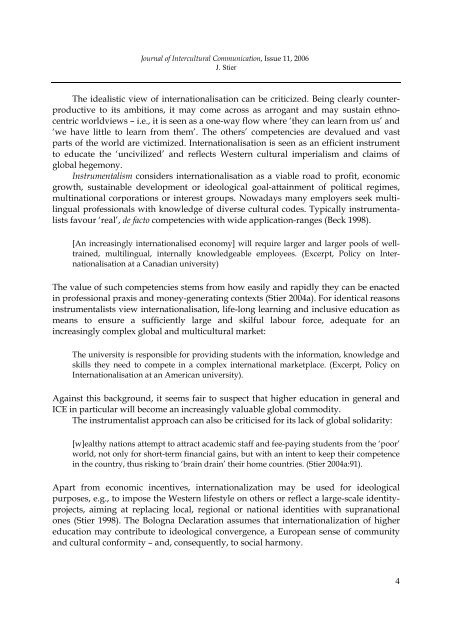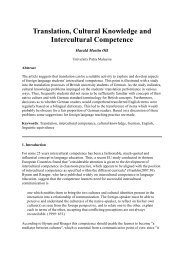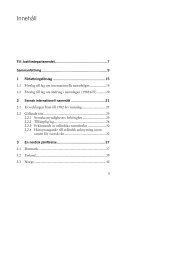Internationalisation, intercultural communication and intercultural ...
Internationalisation, intercultural communication and intercultural ...
Internationalisation, intercultural communication and intercultural ...
Create successful ePaper yourself
Turn your PDF publications into a flip-book with our unique Google optimized e-Paper software.
Journal of Intercultural Communication, Issue 11, 2006<br />
J. Stier<br />
The idealistic view of internationalisation can be criticized. Being clearly counterproductive<br />
to its ambitions, it may come across as arrogant <strong>and</strong> may sustain ethnocentric<br />
worldviews – i.e., it is seen as a one-way flow where ‘they can learn from us’ <strong>and</strong><br />
‘we have little to learn from them’. The others’ competencies are devalued <strong>and</strong> vast<br />
parts of the world are victimized. <strong>Internationalisation</strong> is seen as an efficient instrument<br />
to educate the ‘uncivilized’ <strong>and</strong> reflects Western cultural imperialism <strong>and</strong> claims of<br />
global hegemony.<br />
Instrumentalism considers internationalisation as a viable road to profit, economic<br />
growth, sustainable development or ideological goal-attainment of political regimes,<br />
multinational corporations or interest groups. Nowadays many employers seek multilingual<br />
professionals with knowledge of diverse cultural codes. Typically instrumentalists<br />
favour ‘real’, de facto competencies with wide application-ranges (Beck 1998).<br />
[An increasingly internationalised economy] will require larger <strong>and</strong> larger pools of welltrained,<br />
multilingual, internally knowledgeable employees. (Excerpt, Policy on <strong>Internationalisation</strong><br />
at a Canadian university)<br />
The value of such competencies stems from how easily <strong>and</strong> rapidly they can be enacted<br />
in professional praxis <strong>and</strong> money-generating contexts (Stier 2004a). For identical reasons<br />
instrumentalists view internationalisation, life-long learning <strong>and</strong> inclusive education as<br />
means to ensure a sufficiently large <strong>and</strong> skilful labour force, adequate for an<br />
increasingly complex global <strong>and</strong> multicultural market:<br />
The university is responsible for providing students with the information, knowledge <strong>and</strong><br />
skills they need to compete in a complex international marketplace. (Excerpt, Policy on<br />
<strong>Internationalisation</strong> at an American university).<br />
Against this background, it seems fair to suspect that higher education in general <strong>and</strong><br />
ICE in particular will become an increasingly valuable global commodity.<br />
The instrumentalist approach can also be criticised for its lack of global solidarity:<br />
[w]ealthy nations attempt to attract academic staff <strong>and</strong> fee-paying students from the ‘poor’<br />
world, not only for short-term financial gains, but with an intent to keep their competence<br />
in the country, thus risking to ‘brain drain’ their home countries. (Stier 2004a:91).<br />
Apart from economic incentives, internationalization may be used for ideological<br />
purposes, e.g., to impose the Western lifestyle on others or reflect a large-scale identityprojects,<br />
aiming at replacing local, regional or national identities with supranational<br />
ones (Stier 1998). The Bologna Declaration assumes that internationalization of higher<br />
education may contribute to ideological convergence, a European sense of community<br />
<strong>and</strong> cultural conformity – <strong>and</strong>, consequently, to social harmony.<br />
4

















